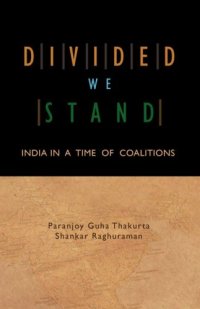
Ebook: Divided We Stand: India in a Time of Coalitions
- Year: 2008
- Language: English
- pdf
This topical and absorbing book, written by two eminent journalists, explains why India has entered a new era of coalition politics. It analyses the consequences and implications of this relatively recent phenomenon. India has come a long way from the time since the Congress dominated the country's polity. The authors argue that the multi-party structure of government, or a coalition government, is neither temporary nor an aberration. Coalitions are here to stay, at least in the foreseeable future. The authors dismiss the view that India's polity is essentially bipolar, that is, led by either of the two largest political parties - the Congress or the Bharatiya Janata Party. They do not accede to the contention that other political parties have no option but to align themselves with either the Congress or the Bharatiya Janata Party. Continuing the analysis begun in their earlier work, India in a Time of Coalitions: Divided we Stand (Sage, 2004) both authors skilfully piece together the complex jigsaw of Indian politics. The authors point to the fragmentation of Indian polity with the rise of caste-based and regional parties and the formation of coalitions at the federal as well as provincial levels. This, they say, should not be perceived as a negative feature but as a positive influence on the working of the country's democratic structures. The authors take the view that coalition governments are in fact better equipped to deal with the tensions of India's deeply divided and highly hierarchical society. In comparison, governments dominated by single parties tend to both centralize and homogenize. Among the issues the book analyzes are " The impact of the April-May 2004 general elections that saw the dramatic decline of the National Democratic Alliance led by the BJP and its replacement by a government formed by the United Progressive Alliance coalition led by the Congress with outside support from four left parties " A gradual revival in the fortunes of the Congress after the party had witnessed its traditional supporters - including the minorities and the disadvantaged groups - deserting it in large numbers " The sudden rise and fall of the BJP from the time it was almost wiped out in 1984, the party's faction-ridden character and its inability to quickly come to terms with its electoral defeat in 2004 " The growing importance and the changing tactics of the left parties, their internal differences and mainstreaming and their influence on the country's economic policies " The crucial question of whether coalitions can provide stable governments and under what circumstances " The possibility of alternate political formations - led neither by the Congress nor the BJP - coming to power at the centre " The extent to which political coalitions have led to better governance, brought about a greater degree of federalism and reduced the incidence of corruption " The manner in which successive governments have handled the new politics of economic liberalization and globalization together with the crucial issue of growth with equity Challenging many commonly held views regarding India's political processes, this fascinating book will delight anyone interested in Indian politics at the beginning of the 21st century.
Download the book Divided We Stand: India in a Time of Coalitions for free or read online
Continue reading on any device:

Last viewed books
Related books
{related-news}
Comments (0)